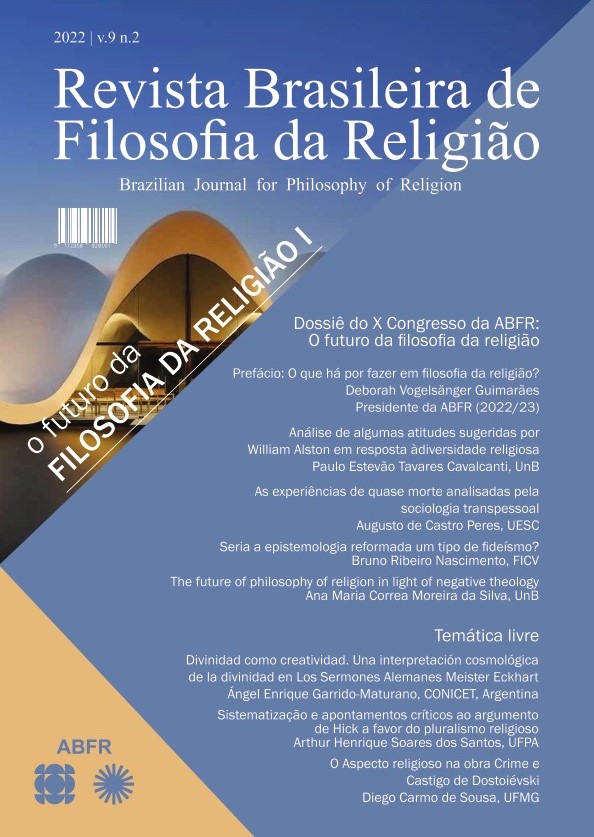Divinity as creativity. A cosmological reinterpretation of divinity in Meister Eckhart's German Sermons
DOI:
https://doi.org/10.26512/2358-82842022e50863Keywords:
Cosmología – Creatividad – Dios – Divinidad – EckhartAbstract
The article analyzes from a philosophical and transcendental perspective the Eckhartian idea of divinity. First, the analysis makes explicit the extent to which divinity can be thought of as pure and indeterminate creativity or creative potential that traverses the universe. Second, it determines the point at which this philosophical understanding of divinity becomes mystical-religious, namely, that at which creativity is oriented toward the idea of the consummation of all beings in God. Finally, it elucidates the cosmological and ethical consequences of the notion of divinity and determines why they confer to the Master's thought today a peculiar validity.
References
BARA BANCEL, Silvia (2008). “Para entender al Maestro Eckhart y la mística alemana”, Ciencia Tomista, n⸰ 135, 453-485.
ECKHART, Meister (1979). Deutsche Predigten und Traktate. Zürich: Diogenes.
ECKHART,Meister (1958). Die deutschen Werke. Erster Band: Predigter erster Band. Stuttgart: Kohlhammer.
ENDERS, Markus (2011). “Deus unus est. Meister Eckharts Metaphysik der Einheit und ihr intellekttheoretisches Fundament”, en Einheit und Vielheit als metaphysisches Problem, por J. Brachtendorf y S. Herzberg (eds.). Tübingen: Mohr Siebeck, 109-135.
ENDERS, Markus (1997). “Die Reden der Unterweisung. Eine Lehre vom richtigen Leben durch guten und vollkommenen Willen”, en Meister Eckhart: Lebens-Stationen – Rede-Situationen, por K. Jacobi (ed.). Berlin: Akademie Verlag, 69-92.
FILIPPI, Silvana (2003). “Martin Heidegger y la mística eckhartiana”, Invenio, n⸰ 11, 33-39.
FINK, Eugen (1985). Einleitung in die Philosophie, Würzburg: Könighausen & Neumann.
GARCÍA BAEZA, Ricardo (2011). “El concepto de origen en Meister Eckhart y la relevancia filosófica de su pensamiento en la obra de Martin Heidegger”, Pensamiento, vol. 67, n⸰ 252, 197-212.
HAAS, Alois, BINOTTO Tomas (2013). Meister Eckhart: der Gottsucher. Aus der Ewigkeit ins Jetzt, Freiburg i. B: Kreuz Verlag.
MAESTRE SÁNCHEZ, Alfonso (2007), “Maestro Eckhart (1260-1327) o la «secularización» de la experiencia mística cristiana”, Anales del Seminario de Historia de la Filosofía, vol. 24, 119-140.
MIETH, Dietmar (2015). “Meister Eckhart als Spirituelles Vorbild und theologische Herausforderungen”, en Meister Eckhart und Bernhard Welte. Meister Eckhart als Inspirationsquelle für Bernhard Welte und fur die Gegenwart, por M. Enders (ed.). Berlín: Litt, 103-118.
MIETH Dietmar (2014). Meister Eckhart, München: C. H. Beck.
ROESNER, Martina (2020). Ich–Logos–Welt. Der egologische Ansatz der Ersten Philosophie bei Meister Eckhart und Edmund Husserl, Freiburg/ München: Alber.
WELTE, Bernhard (1992). Meister Eckhart. Gedanken zu seinem Gedanken, Freiburg/ Basel/ Wien: Herder.
Downloads
Published
Issue
Section
License
Copyright (c) 2024 Brazilian Journal for Philosophy of Religion

This work is licensed under a Creative Commons Attribution 4.0 International License.

